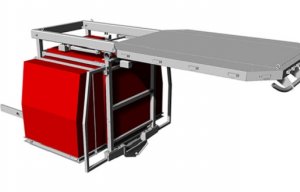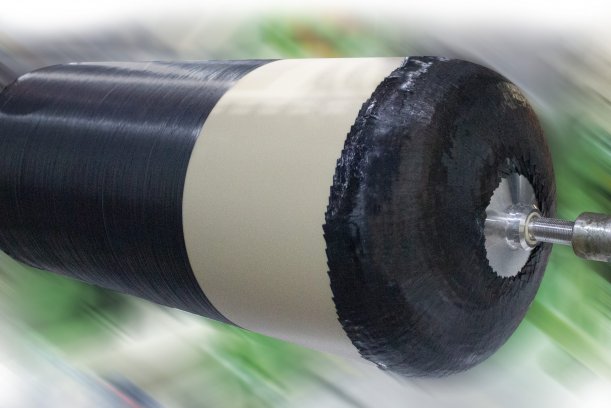
Lightweight fiberglass tank for off-road fire tanker
Approach reduces net fibre usage by approximately 15%, depending on the vessel characteristics.

15th April 2024
Innovation in Textiles
|
Munich, Germany
Cevotec showcased its latest Samba Pro PV system dedicated to dome reinforcements for sustainable hydrogen tank production at JEC World 2024 in Paris in March, and the system will be available for commercial projects at the company’s lab in Munich, Germany, from next month.
The company has already partnered with a tank manufacturer, winding equipment provider Roth Composite Machinery and the composite engineering service provider Cikoni to fully investigate the effect of dome reinforcements using fibre patch placement (FPP) technology. It reduces the amount of carbon fibre needed for a composite tank by locally reinforcing the tank’s dome areas directly onto the liner, using a fully automated, industrial process which can be combined with any existing wet or towpreg winding equipment.
The approach reduces net fibre usage by approximately 15%, depending on the vessel characteristics, which translates into considerable weight and cost savings while maintaining equivalent mechanical properties. Due to the material reduction, the reinforced tanks can also feature more storage volume in the same build space and have an improved CO2 footprint.
An optimised full-scale demonstrator has been successfully developed in collaboration with the project partners. The primary goal was to optimise the fibre lay-up to reduce weight, costs and production time. The project comprised all aspects from laminate design, simulation and optimisation driven by Cikoni, to the actual production and testing of the reinforced tanks. Additionally, the effectiveness of FPP dome reinforcements within an industrial production environment has been evaluated.
“The 300 bar type IV tank has a thinner composite overwrap with a lower number of layers to be replaced by dome reinforcements, which is a challenging set-up compared to 700-bar-class vessels”, explains Dr Florian Lenz, Cevotec technical director. “To achieve the optimal material saving design, different laminate iterations were pursued. In a third iteration, we successfully achieved a burst safety factor of 108% and material savings of 15%.”.
“The expected fibre demand for H2 tanks will outgrow available supply in the next ten years,” added Cevotec CEO Thorsten Groen. “Technologies like FPP that enable resource savings are strategically important for global competitiveness.”

Business intelligence for the fibre, textiles and apparel industries: technologies, innovations, markets, investments, trade policy, sourcing, strategy...
Find out more